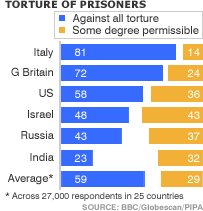World Split in Torture ” Ethics ” – Israelis Top 43 % Endorse Torture
Muslims in Israel, who represent 16% of the total number polled, are overwhelmingly against any use of torture.
All of the countries surveyed have signed up to the Geneva Conventions which prohibit the use of torture and cruel and degrading behaviour.
“We are judged by how we treat our enemies rather than how we treat our friends” Jay Kandy, London
Countries that face political violence are more likely to accept the idea that some degree of torture is permissible because of the “extreme threat posed by terrorists”.
The Israelis has the largest percentage of those polled endorsing the use of a degree of torture on prisoners, with 43% saying they agreed that torture should be allowed.
The question
Most countries have agreed to rules prohibiting torturing prisoners. Which position is closer to yours?
“Terrorists pose such an extreme threat” that governments should now be allowed to use some degree of torture if it may gain information that saves innocent lives
Clear rules against torture should be maintained because any use of torture is immoral and will weaken international human rights
World split on torture ethics
Other countries that polled higher levels of acceptance of the use of torture include Iraq (42%), the Philippines (40%), Indonesia (40%), Russia (37%) and China (37%).
The Israeli figure conceals a stark difference in attitude within the country, split along religious lines.
A majority of Jewish respondents in Israel, 53%, favour allowing governments to use some degree of torture to obtain information from those in custody, while 39% want clear rules against it.
Meanwhile opposition to the practise is highest in Italy, where 81% of those questioned think torture is never justified.
Australia, France, Canada, the UK and Germany also registered high levels of opposition to any use of torture.
Views on torturing prisoners
Country
Against all torture * Some degree permissible * Neither/Don’t Know
Australia 75% 22% 3%
Brazil 61% 32% 8%
Canada 74% 22% 4%
Chile 62% 22% 16%
China 49% 37% 13%
Egypt 65% 25% 9%
France 75% 19% 6%
Germany 71% 21% 7%
Gt Britain 72% 24% 4%
India 23% 32% 45%
Indonesia 51% 40% 8%
Iraq 55% 42% 1%
Israel 48% 43% 9%
Italy 81% 14% 6%
Kenya 53% 38% 9%
Mexico 50% 24% 27%
Nigeria 49% 39% 12%
Philippines 56% 40% 5%
Poland 62% 27% 12%
Russia 43% 37% 19%
S Korea 66% 31% 3%
Spain 65% 16% 19%
Turkey 62% 24% 14%
Ukraine 54% 29% 18%
US 58% 36% 7%
Average 59% 29% 12%
*27,000 respondents in 25 countries were asked which position was closer to their own views:
* Clear rules against torture should be maintained because any use of torture is immoral and will weaken international human rights standards against torture.
* Terrorists pose such an extreme threat that governments should now be allowed to use some degree of torture if it may gain information that saves innocent lives.
The survey was carried out for the BBC World Service by polling firm Globescan and the Program on International Policy Attitudes (PIPA).
All of the countries surveyed have signed up to the Geneva Conventions which prohibit the use of torture and cruel and degrading behaviour.
Source: BBC/Globescan/PIPA


